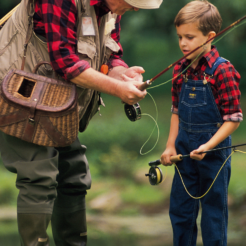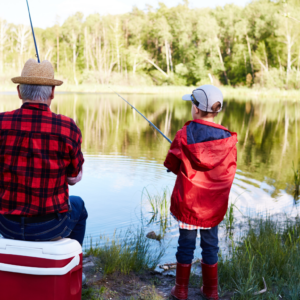You've recently retired and are perhaps even searching online for 'things to do while retired' ...now what?
With more time on your hands, retirement is the perfect opportunity to dive into new passions that keep you active, engaged, and fulfilled. Whether it’s picking up a hobby you’ve always wanted to try or dedicating more time to outdoor activities, making the most of your newfound freedom is key to a rewarding retirement. If you’re wondering what to do when retired, look no further than fly fishing in Ontario. This timeless sport offers the ideal blend of tranquility, excitement, and lifelong learning—making fly fishing one of the best hobbies to take up, especially during your retirement years.
5 Reasons to Pursue Fly Fishing During Your Retirement

1. A Perfect Balance of Activity and Relaxation
Fly fishing combines both mental and physical activity while immersing you in the calming effects of nature. Unlike high-impact sports, it’s easier on the body while still keeping you moving, helping to maintain mobility and dexterity. More often than not, you’ll get your steps in for the day by wading into a serene river, hiking along a streamside trail, or even standing on a casting deck or boat, which strengthens core muscles and improves balance. Since back and shoulder pain are common issues for anglers after long days on the water, it’s important to stay active, stretch, and maintain good physical health.
2. A Great Way to Connect with Nature & the Outdoors
Spending time outside is beneficial for both mental and physical health. Fly fishing immerses you in nature, offering a chance to observe wildlife, study water flows, and understand the life cycles of the insects that fish feed on. Time spent outdoors has been linked to lower stress levels, improved mood, and enhanced overall well-being. The calming sound of flowing water, the fresh air, and the rhythmic motion of casting all contribute to a meditative state, allowing anglers to disconnect from daily worries and fully appreciate the beauty around them.
Additionally, being outside promotes better physical health, as exposure to natural sunlight increases vitamin D levels, which supports bone health and immune function. The mild physical activity involved in fly fishing, such as wading through streams or hiking to remote fishing spots, helps maintain cardiovascular fitness without excessive strain.
Fishing clubs in Ontario, like The Franklin Club, provide access to pristine fishing spots where you can fully embrace the tranquility of the outdoors, making it easier than ever to integrate the benefits of nature into your retirement lifestyle.
3. A Social and Community-Oriented Hobby
Fly fishing isn’t just a solitary activity—it’s also a great way to build friendships and strengthen family bonds. Many retirees join fishing clubs to meet like-minded individuals, exchange tips, companionship and outings. The Franklin Club fosters a warm and welcoming community where members can share their passion for fly fishing, participate in club events, and join fly tying groups to learn from other anglers’ experiences.
Additionally, fly fishing presents a wonderful opportunity to spend quality time with family, friends, colleagues, and younger generations. Whether it’s teaching your children or grandchildren how to cast, identifying insects and hatches together, or simply sharing the peacefulness of the water in search of the thrill of the catch, fly fishing creates meaningful moments that become cherished memories. Passing down knowledge and love for the sport not only strengthens relationships but also instills a deeper appreciation for nature and conservation in future anglers.
4. Destination Trips, Travel and Exploration: There’s Adventure in Fly Fishing
For many fly anglers, the adventure doesn’t stop at local waters. Fly fishing is an incredible way to travel and explore new destinations, targeting different species around the world. With more time on your hands, retirees often venture to places like Quebec and Nova Scotia to pursue the thrill of Atlantic Salmon fishing or hop aboard a plane to venture into tropical destinations like the Bahamas, Cuba, and Belize to chase the exciting challenge of saltwater species like bonefish, tarpon, and the elusive permit. Whether it’s a local pond, a scenic drive to a pristine mountain stream, or a flight to warm coastal flats, fly fishing offers endless opportunities to discover new places, people, and waters—allowing you to chase the thrill of the catch and create unforgettable experiences during your retirement years.
5. Fly Tying: A Creative and Rewarding Skill for Retirees
Fly fishing isn’t just about being on the water; it also offers an engaging indoor activity—fly tying. It’s often said that enthusiastic fly anglers have “caught the bug,” and now they can create them! Making your own flies enhances the fishing experience, giving you a deeper appreciation of the sport. There’s nothing quite like catching a fish on a fly pattern you’ve tied yourself.
Fly tying is an excellent way to keep the mind active, requiring focus, patience, and fine motor skills. Handling delicate materials, threading hooks, and crafting intricate fly patterns help maintain hand-eye coordination and dexterity, both of which are essential for healthy aging. Engaging in this hobby keeps your brain engaged, stimulating creativity and problem-solving as you experiment with different techniques and materials.
Fly tying is both experimental and creative, allowing you to work with different materials and techniques to craft effective fly patterns. It’s also a satisfying way to restock your fly boxes between outings and during the off-season. With many printed and online resources available today, learning to tie flies has never been easier. You may also consider joining any Fly tying groups where you can learn to refine your skills and craft on the fly tying vise.
Some Health Benefits of Fly Fishing in Retirement
Keeping the Mind Active Through Fly Fishing
One of the most rewarding aspects of fly fishing is the continuous learning it offers. Observing and understanding seasonal insect cycles is a fundamental part of the sport. By studying the life cycles of various aquatic insects, fly anglers can improve their success on the water while keeping their minds engaged while in natural surroundings. Identifying insect species, adapting fly patterns accordingly, and predicting fish behaviour requires problem-solving skills that keep the brain sharp and engaged—making fly fishing a mentally stimulating and rewarding retirement hobby.
Additionally, fly fishing engages fine motor skills through tasks like lining up your rod, fly casting, stripping or retrieving your fly through the water, reeling in and many more. These small, precise movements help maintain hand-eye coordination, finger dexterity, and overall motor function, which can be beneficial for aging individuals. Regularly practicing these skills promotes neural connectivity, potentially reducing cognitive decline and maintaining cognitive sharpness.
Fly fishing also encourages mindfulness, as the focus required for timing your casting stroke, hitting your target, observing the waters activity and conditions, along with tracking fish movements fosters a present-moment awareness that can improve mental clarity and reduce anxiety. Engaging in these activities can help to maintain an active and engaged mind, making each outing an enriching and active experience.
1. Physical Benefits
- Improves coordination, balance, and dexterity
- Low-impact exercise that promotes movement without strain
- Encourages gentle walking and wading, strengthening muscles and cardiovascular health
- Enhances flexibility and range of motion through repetitive casting motions
2. Mental and Emotional Benefits
- Reduces stress and promotes relaxation through nature immersion
- Provides a sense of accomplishment and purpose
- Keeps the mind sharp by learning new techniques and strategies
- Enhances memory retention through pattern recognition and problem-solving
- Encourages social engagement, reducing feelings of isolation and loneliness
Considering Joining a Fly Fishing Club in Retirement?
Access to Private Waters and Amenities
Fishing clubs provide access to well-maintained facilities and grounds ensuring an enjoyable fishing experience without having to compete with the crowds. Fishing clubs like The Franklin Club, provide the benefit of fishing all year without the need of a provincial fishing license, making it even more convenient to get on the water and enjoy the sport. Beyond fishing access, many clubs provide other amenities such as comfortable lodges, on-site dining, gear storage, and fly-tying stations.
Expert Guidance and Community Support
Learn from experienced anglers, club pros, and participate in workshops to improve your fly fishing and fly tying skills. Whether you’re refining your casting technique, learning to tie effective fly patterns, or gaining insights on reading water conditions, a fishing club provides an invaluable support system to help you grow as an angler. Some offer guided excursions, casting clinics, and social meets where members can relax and connect with each other. Such community events help enhance the membership experience, making fishing clubs an excellent choice for retirees looking to enjoy their time on and off the water in a welcoming and well-equipped environment.
Exclusive Member Events and Family Gatherings
Fly fishing clubs offer a variety of exclusive events designed to bring family and friends together. From seasonal fishing tournaments and outdoor barbecues to holiday gatherings and fly-tying workshops, these clubs create opportunities to share memorable experiences. Many clubs host family-friendly days where members can introduce their children and grandchildren to the sport, making it a multi-generational activity. Whether you’re teaching a young angler how to cast or reminiscing over a successful day on the water with lifelong friends, these gatherings foster camaraderie and deepen connections. Fly fishing clubs provide the perfect setting to celebrate milestones, share traditions, and create lasting memories in a welcoming and scenic environment.
Final Reflections - Make Fly Fishing Your Go-To Retirement Hobby!

As mentioned in the beginning… “You’ve recently retired—Now what?”
Retirement brings the gift of time and freedom—the perfect opportunity to embrace new passions or deepen existing ones. Fly fishing is more than just a pastime; it’s a rewarding pursuit that keeps you active, engaged, and connected to the outdoors. Whether you’re new to the sport or a seasoned angler eager to refine your skills, fly fishing offers a unique blend of physical activity, mental challenge, and social interaction.
Beyond the thrill of the catch, it provides a sense of tranquility, a reason to explore the outdoors, and an opportunity to build lasting friendships. The rhythm of casting, the patience required, and the satisfaction of mastering the technique create a fulfilling experience that extends beyond the water’s edge. Keep active, sharpen your mind, and connect with a welcoming community—all while immersing yourself in the beauty of nature.


